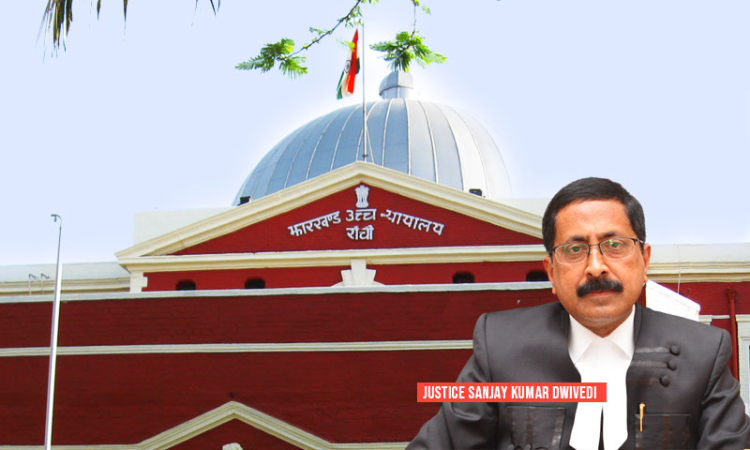- Home
- /
- High Courts
- /
- Jharkhand High Court
- /
- Order 6 Rule 17 CPC | Effect Of An...
Order 6 Rule 17 CPC | Effect Of An Admission In Pleading Can't Be Diluted By Proposed Amendment At Appellate Stage: Jharkhand High Court
Bhavya Singh
8 Aug 2025 9:00 AM IST
The Jharkhand High Court has held that an amendment to pleadings at the appellate stage cannot be allowed when the party seeking it fails to offer strong reasons for the delay and does not carry out the earlier permitted amendment during trial.Justice Sanjay Kumar Dwivedi, presiding over the case, observed that Order VI Rule 17 of the CPC confers a discretionary jurisdiction on the...
The Jharkhand High Court has held that an amendment to pleadings at the appellate stage cannot be allowed when the party seeking it fails to offer strong reasons for the delay and does not carry out the earlier permitted amendment during trial.
Justice Sanjay Kumar Dwivedi, presiding over the case, observed that Order VI Rule 17 of the CPC confers a discretionary jurisdiction on the Court exercisable at any stage of the proceedings to allow either party to alter or amend his pleadings in such manner and on such terms as may be just.
The high court said that the rule goes on to provide that all such amendments shall be made as may be necessary for the purpose of determining the real questions in controversy between the parties.
It observed that unless the Court is told in what manner the pleading originally submitted to the Court is proposed to be altered or amended, the Court cannot effectively exercise its power to permit amendment.
“An amendment may involve withdrawal of an admission previously made, may attempt to introduce a plea or claim barred by limitation or may be so devised as to deprive the opposite party of a valuable right accrued to him by lapse of time and so on. It is, therefore, necessary for an amendment applicant to set out specifically in his application, seeking leave of the Court for amendment in the pleadings, as to what is proposed to be omitted from or altered or substituted in or added to the original pleadings...It is well-settled that an amendment cannot be allowed, if it causes prejudice to the right of the party against whom an amendment is sought for.... An amendment admitting to wipe out the pleadings and admissions of the party, already considered by the Trial Court, for the purpose of arriving at a decision, in the suit, cannot be allowed to be substituted with a new case, at the appellate stage, which would certainly cause serious prejudice to the party, against whom the amendment is sought for. The effect of an admission in earlier pleading shall not be permitted to be taken away, by any proposed amendment at the appellate stage,” Justice Dwivedi added.
The above ruling was made in a petition filed under Article 227 of the Constitution of India seeking to set aside the order passed in Miscellaneous Civil Application by the District Court. The underlying proceedings arose out of a Civil Appeal which had been filed by the defendants against a decree passed in a Title (Partition) Suit.
The petitioner, Prabodh Kumar, had originally filed the partition suit seeking a decree for allocation of his shares in the ancestral property. During the trial, an amendment petition under Order VI Rule 17 CPC was allowed by the trial court. This amendment included incorporating the name of the petitioner's biological mother into the genealogical table.
However, despite the amendment having been allowed by the trial court, it was not carried out in the plaint. The suit was later decreed in the petitioner's favour. After the decree, the defendants filed a Civil Appeal, during which, it came to light that the allowed amendment had not been incorporated in the plaint.
The petitioner, therefore, filed a fresh application under Order VI Rule 17 read with Rule 18 CPC before the appellate court to formally carry out the amendment - which was rejected; against this he moved the High Court.
On facts, it was noted by the High Court that while the trial court had indeed allowed Amendment No. VII, the petitioner failed to implement it. The copy served to the defendants did not contain the amendment in typed form; instead, it had been handwritten. Furthermore, the High Court noted that the petitioner made no effort to explain why the amendment had not been incorporated earlier or why it was being sought only at the appellate stage.
Referring again to the requirements under Order VI Rule 17 CPC, the Court reiterated “For allowing the amendment particularly at the appellate stage after conclusion of the trial, the parties are required to offer a reasonable explanation for the delay in making the application seeking amendment and particularly when such amendment is sought for, at the appellate stage, the party seeking amendment should adduce, strong and valid reasons, as to why the amendment sought for, was not made in the Trial Court.”
Finding no error in the order of the first Appellate Court, the high court dismissed the plea.
Case Title: Prabodh Kumar Tiwary v. Rakesh Kumar Tiwary & Ors.
Case Number: C.M.P. No. 436 of 2025



